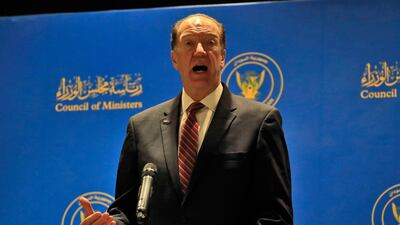Developed nations should do more to cut their greenhouse gas emissions and must help emerging economies to meet their green commitments, World Bank president David Malpass said.
Mr Malpass told a World Bank event on Thursday that advanced economies have historically emitted most of the world's man-made greenhouse gases.
"These countries need to significantly step up every effort to reduce greenhouse gas emissions and extend support to the rest of the world," he said.
Poorer nations need investments to develop climate-resilient infrastructure and low-carbon energy at scale, Mr Malpass said.
The Covid-19 pandemic has highlighted the importance of investing to meet UN climate goals and move to a net-zero economy.
Under the 2015 Paris Agreement, countries are supposed to lower carbon emissions in an attempt to cap the global temperature rise at 1.5°C above pre-industrial levels.
About 30,000 delegates are expected to descend on Glasgow, Scotland from October 31 for the two-week Cop26 conference, where world leaders will make new pledges to reduce emissions.
Mr Malpass said middle-income economies such as Colombia should also contribute to global efforts and ease emissions.
Colombian President Ivan Duque said his country aimed to "reduce all of our greenhouse gas emissions by 51 per cent by 2030 and reach the carbon neutrality by 2050”.
Colombia is also focusing on “carbon-neutral nature positive policies”, Mr Duque said.
He said the South American nation had set a goal to end deforestation by 2030.
The world’s cities need trillions more dollars to invest annually to meet urban climate finance needs, a June report by the Cities Climate Finance Leadership Alliance and the World Bank said.
An average of $384bn was invested annually on urban climate finance in 2017-2018, compared with the estimated $4.5 trillion to $5.4tn needed, the report said.
Industry experts emphasised the need for more funds, especially to developing economies, to achieve climate goals.

“The multilateral development banks [such as the World Bank and the International Monetary Fund] play a leading role here,” US Treasury Secretary Janet Yellen said at the event.
"They help the emerging economies prioritise climate investments, integrate climate resilience into infrastructure planning, and protect critical ecosystems.
“The US is a large shareholder in the multilateral development banks and we are committed to using our leadership position to facilitate global transition to net-zero emissions by mid-century.”
Ms Yellen said public financing alone would not be enough to meet the Paris goals.
“Private capital will be essential to fill the gap," she said.
"We must continue to focus on addressing the ongoing challenges in emerging markets and developing countries and attracting private-sector financing."
The World Bank has said climate change could force 216 million people around the world to move within their countries by 2050, with hotspots of internal climate migration emerging as early as 2030.
Climate-induced migration could hit the poorest countries the hardest unless urgent action is taken to reduce global emissions, the lender said.
By 2050, there could be as many as 86 million internal climate migrants in sub-Saharan Africa, 49 million in East Asia and the Pacific, and 40 million in South Asia, said the lender's updated Groundswell report, which was released this week.
It said there could be 19 million in North Africa, 17 million in Latin America and 5 million in Eastern Europe and Central Asia.
“The World Bank has been scaling up its [climate] engagement,” said the lender’s managing director of operations, Axel van Trotsenburg.
“We have had a very strong last five years where we delivered over $83bn in climate-related financing. Our intention is to increase this by up to 50 per cent in the next five years."








